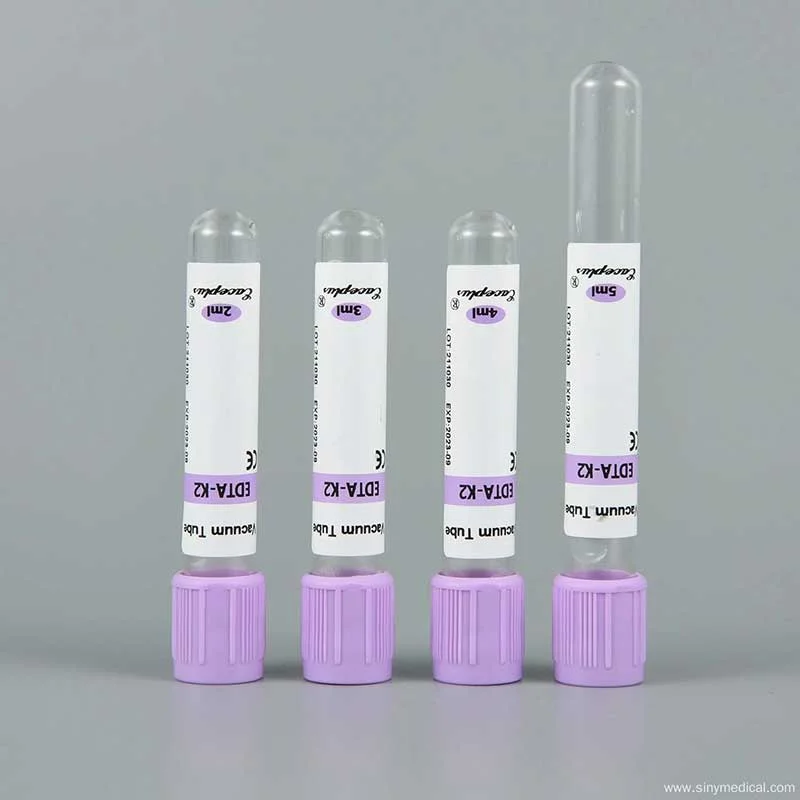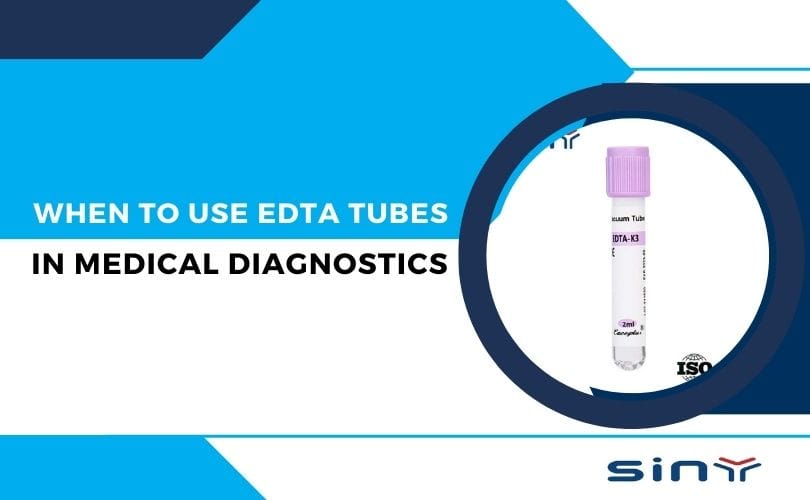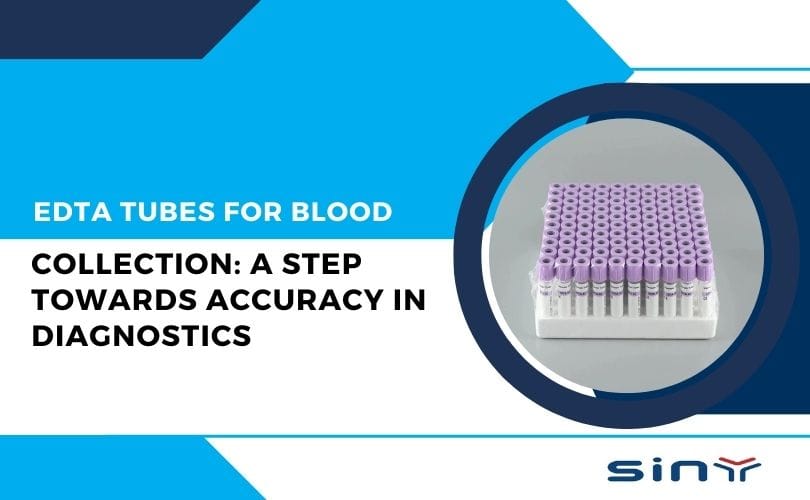Blood tests are essential for diagnosing and monitoring various medical conditions. However, the accuracy of these tests heavily depends on the type of collection tube used. One of the most commonly used tubes in laboratory testing is the EDTA (Ethylenediaminetetraacetic acid) tube. These tubes prevent blood from clotting, making them indispensable in hematology and specialized molecular diagnostics.
In this blog, we’ll discuss the top 5 lab tests that require EDTA tubes, why they are necessary, and how to handle them properly to ensure precise results.
What Are EDTA Tubes and Why Are They Important?
EDTA tubes contain an anticoagulant called ethylenediaminetetraacetic acid (EDTA), which binds calcium ions in the blood. This process prevents clotting, ensuring that blood samples remain in their liquid form for accurate analysis. These tubes are essential in tests requiring whole blood or plasma and are primarily used in hematology, molecular diagnostics, and certain specialized biochemical tests.

There are different types of EDTA tubes available, including:
- K2 EDTA tubes – Used for whole blood and plasma preparation.
- K3 EDTA tubes – Preferred for automated blood analyzers.
- Spray-dried EDTA tubes – Used for specific molecular and genetic studies.
Now, let’s explore the top 5 laboratory tests that require EDTA tubes and why they are indispensable for accurate results.
Complete Blood Count (CBC) Test
The Complete Blood Count (CBC) test is one of the most commonly performed blood tests. It provides critical information about overall health by measuring different components of blood, including:
- Red blood cells (RBCs) – Carry oxygen throughout the body.
- White blood cells (WBCs) – Help fight infections.
- Hemoglobin levels – Indicate oxygen-carrying capacity.
- Hematocrit levels – Measure the proportion of red blood cells.
- Platelet count – Essential for blood clotting.
Why Use EDTA Tubes?
EDTA tubes are essential for CBC tests because they prevent clotting and preserve the integrity of blood cells, ensuring accurate results. Without anticoagulation, blood cells can clump together, leading to misleading readings.
Blood Smear and Peripheral Blood Film
A blood smear test involves spreading a thin layer of blood on a slide and staining it to analyze the morphology of blood cells under a microscope. It is commonly used to detect:
- Blood disorders like anemia and leukemia.
- Parasitic infections such as malaria.
- Abnormalities in red and white blood cells.
Why Use EDTA Tubes?
Using an EDTA tube ensures that the sample remains free of clots, which is critical for preparing an accurate blood smear. EDTA also prevents cell distortion, allowing for a precise morphological study.
Hemoglobin A1c (HbA1c) Test
The Hemoglobin A1c (HbA1c) test is crucial for monitoring long-term blood sugar control in diabetic patients. It measures the percentage of glycated hemoglobin in red blood cells, reflecting average blood glucose levels over the past 2-3 months.
Why Use EDTA Tubes?
EDTA preserves the sample without affecting the hemoglobin structure, ensuring that HbA1c levels remain accurate during laboratory analysis. Proper handling and storage of EDTA tubes are essential to avoid degradation of the sample.
Molecular and Genetic Testing
Molecular tests, such as DNA and RNA analysis, rely heavily on EDTA-treated blood samples. These tests help detect genetic disorders, infectious diseases, and even cancer markers. Common examples include:
- Polymerase Chain Reaction (PCR) tests – Used for infectious disease detection like HIV and COVID-19.
- Genetic mutation screening – Helps diagnose hereditary conditions.
- Flow cytometry – Analyzes cell populations for immune disorders and cancer diagnostics.
Why Use EDTA Tubes?
EDTA stabilizes nucleic acids (DNA/RNA), preventing degradation. Unlike other anticoagulants, EDTA does not interfere with molecular testing, making it the preferred choice for genetic studies.
Blood Typing and Crossmatching
Blood typing and crossmatching are critical in transfusion medicine. These tests determine a patient’s blood type and compatibility before a transfusion, preventing adverse reactions.
Why Use EDTA Tubes?
EDTA preserves red blood cells in their natural state, ensuring reliable blood grouping results. The EDTA tubes from trusted manufacturers are specifically designed to maintain sample stability for blood compatibility testing.
Practices for Handling and Storing EDTA Tubes
To ensure accuracy, proper handling of EDTA tubes is essential. Here are some key points:
- Gently invert the tube 8-10 times after collection to mix the anticoagulant properly.
- Avoid excessive shaking, as it can cause hemolysis (breaking of red blood cells).
- Store at recommended temperatures, typically between 2-8°C, for long-term stability.
- Process samples promptly to prevent cell degradation.
For high-quality EDTA tubes, visit EDTA Tube.
EDTA tubes are essential for many lab tests, ensuring accurate and reliable results. From CBC tests to molecular diagnostics, their role in modern laboratory science cannot be overstated. If you’re looking for the best EDTA tubes, check out EDTA Tube for high-quality options.
For more insights, visit our EDTA Tube Blog or contact us for inquiries.
Frequently Asked Questions (FAQs)
Can EDTA tubes be used for coagulation tests?
No, EDTA tubes are not suitable for coagulation studies as they interfere with clotting factors. Citrate tubes are preferred for such tests.
How long can blood samples remain in EDTA tubes before testing?
Most hematology tests should be conducted within 24-48 hours of collection for optimal accuracy. For molecular studies, EDTA samples can be stored longer if frozen.
Can EDTA tubes be reused?
No, EDTA tubes are single-use to prevent contamination and ensure accurate test results.
What color are EDTA tubes?
EDTA tubes typically have a lavender or purple top, indicating the presence of an anticoagulant.
Where can I purchase high-quality EDTA tubes?
You can buy top-grade EDTA tubes for blood collection from EDTA Tube and Siny Medical.






